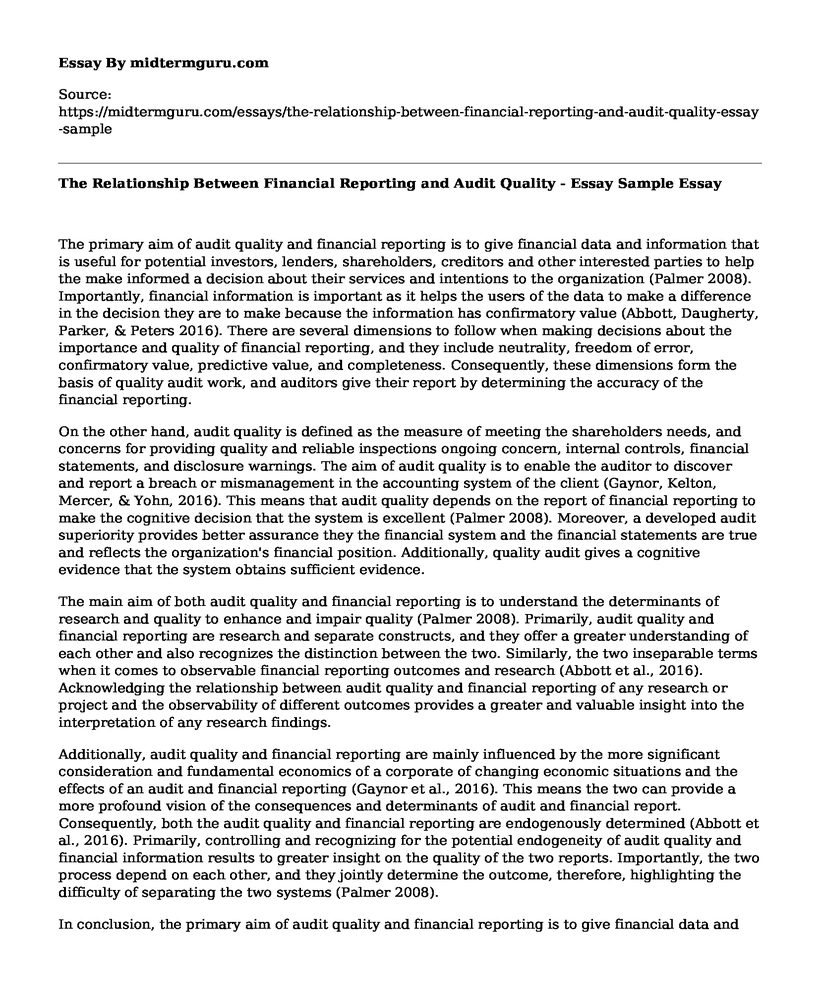The primary aim of audit quality and financial reporting is to give financial data and information that is useful for potential investors, lenders, shareholders, creditors and other interested parties to help the make informed a decision about their services and intentions to the organization (Palmer 2008). Importantly, financial information is important as it helps the users of the data to make a difference in the decision they are to make because the information has confirmatory value (Abbott, Daugherty, Parker, & Peters 2016). There are several dimensions to follow when making decisions about the importance and quality of financial reporting, and they include neutrality, freedom of error, confirmatory value, predictive value, and completeness. Consequently, these dimensions form the basis of quality audit work, and auditors give their report by determining the accuracy of the financial reporting.
On the other hand, audit quality is defined as the measure of meeting the shareholders needs, and concerns for providing quality and reliable inspections ongoing concern, internal controls, financial statements, and disclosure warnings. The aim of audit quality is to enable the auditor to discover and report a breach or mismanagement in the accounting system of the client (Gaynor, Kelton, Mercer, & Yohn, 2016). This means that audit quality depends on the report of financial reporting to make the cognitive decision that the system is excellent (Palmer 2008). Moreover, a developed audit superiority provides better assurance they the financial system and the financial statements are true and reflects the organization's financial position. Additionally, quality audit gives a cognitive evidence that the system obtains sufficient evidence.
The main aim of both audit quality and financial reporting is to understand the determinants of research and quality to enhance and impair quality (Palmer 2008). Primarily, audit quality and financial reporting are research and separate constructs, and they offer a greater understanding of each other and also recognizes the distinction between the two. Similarly, the two inseparable terms when it comes to observable financial reporting outcomes and research (Abbott et al., 2016). Acknowledging the relationship between audit quality and financial reporting of any research or project and the observability of different outcomes provides a greater and valuable insight into the interpretation of any research findings.
Additionally, audit quality and financial reporting are mainly influenced by the more significant consideration and fundamental economics of a corporate of changing economic situations and the effects of an audit and financial reporting (Gaynor et al., 2016). This means the two can provide a more profound vision of the consequences and determinants of audit and financial report. Consequently, both the audit quality and financial reporting are endogenously determined (Abbott et al., 2016). Primarily, controlling and recognizing for the potential endogeneity of audit quality and financial information results to greater insight on the quality of the two reports. Importantly, the two process depend on each other, and they jointly determine the outcome, therefore, highlighting the difficulty of separating the two systems (Palmer 2008).
In conclusion, the primary aim of audit quality and financial reporting is to give financial data and information that is useful for potential investors, lenders, shareholders, creditors and other interested parties to help the make informed decision. On the other hand, audit quality is defined as the measure of meeting the shareholders needs, and concerns for providing quality and reliable inspections ongoing concern, internal controls, financial statements, and disclosure warnings. The aim of audit quality is to enable the auditor to discover and report a breach or mismanagement in the accounting system of the client.
Reference
Abbott, L. J., Daugherty, B., Parker, S., & Peters, G. F. (2016). Internal audit quality and financial reporting quality: The joint importance of independence and competence. Journal of Accounting Research, 54(1), 3-40.
Gaynor, L. M., Kelton, A. S., Mercer, M., & Yohn, T. L. (2016). Understanding the Relation between Financial Reporting Quality and Audit Quality. Auditing: A Journal of Practice & Theory, 35(4), 1-22.
Palmer, P. D. (2008). Audit Quality and Financial Report Disclosure. Flinders Business School Research Paper Series, 1, 1-29.
Cite this page
The Relationship Between Financial Reporting and Audit Quality - Essay Sample. (2021, May 31). Retrieved from https://midtermguru.com/essays/the-relationship-between-financial-reporting-and-audit-quality-essay-sample
If you are the original author of this essay and no longer wish to have it published on the midtermguru.com website, please click below to request its removal:
- Should the Activities of Banks Be Regulated to Avoid Another Global Recession?
- Critical Analysis of the Static Budget - Report Paper Example
- Questions and Answers on Capital Budgeting - Paper Example
- The Variance Calculation in Budgeting - Paper Example
- Paper Example on Consolidated Financial Statement
- Research Paper on Blockchain Technology
- Essay Sample on the Great Depression







